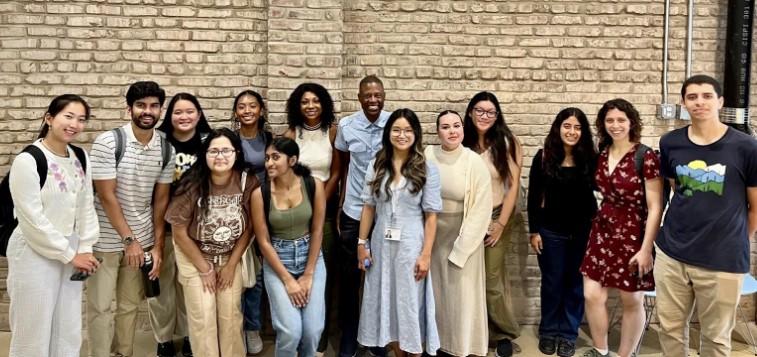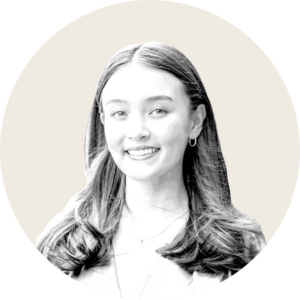The Georgetown University Capitol Applied Learning Labs (CALL) introduced “Health Equity for the Common Good,” an experiential learning course beginning this fall that enables students to enrich their study of public health through numerous visits to community organizations that deliver health-related services in Washington, D.C.
The one-credit, six-week course allows students to directly engage with people working at organizations like AmeriHealth Caritas D.C. and the National Association of County and City Health Officials to develop a more practical understanding of health equity issues, such as insufficient health insurance coverage or racial discrimination in health care settings. These site visits, according to the course catalog description, highlight how various sectors adopt different approaches to address the socioeconomic, political and environmental factors that impact people’s health outcomes, known as the social determinants of health.
Brian Floyd, an assistant dean of the Georgetown University School of Health, currently teaches the class. He said that in creating this new course, he wanted to connect undergraduate students with local professionals who work to make health care policy, access and delivery more equitable.
“It’s very interactive and will allow the student to have a seat at the table with professionals in D.C.,” Floyd told The Hoya. “We’re going to four organizations this year, and the goal is to have conversations that allow students to understand the work they are doing.”
Floyd, who spent over a year developing plans for the course, said it is strongly aligned with the CALL’s commitment to immersive learning experiences and community partnerships.
“I worked with the CALL, which is full of opportunities for students to live downtown, get internships and do experiential learning,” Floyd said. “This course fits very nicely within that space.”
This fall, students in the course will visit the National Academies of Sciences, Engineering, and Medicine, a group of private nonprofit organizations that contribute expert policy recommendations on health and science issues; AmeriHealth Caritas D.C., which provides affordable health services to people on Medicaid and Medicare; the U.S. Department of Health & Human Services Center for Faith-based and Neighborhood Partnerships, which supports partnerships with faith-based and community groups to deliver health care; and the National Association of County and City Health Officials, which supplies funds and training to local health departments.
Floyd said students have the chance to see how health care organizations apply concepts about community and population health on a local, regional and national level through these site visits.
Julie Nguyen (SOH ’24), a student in the inaugural “Health Equity for the Common Good” class, said that these site visits have encouraged her to go beyond the Hilltop and examine public health challenges facing vulnerable populations in the District.
“We cannot sit in our ivory tower and try to guess what underserved communities need,” Nguyen wrote to The Hoya.
In D.C., financial challenges, transportation issues and language barriers can make it difficult for residents — especially those in Wards 7 and 8 — to access health services. Ward 7 and Ward 8 residents are 2-3 times more likely than people in the rest of the city to report that high health care costs prevent them from visiting a doctor, and many residents say that navigating public transportation to and from medical appointments is difficult and time-consuming.
Nguyen said the course has raised her awareness of such health care barriers by encouraging students to venture to parts of the city beyond Georgetown.
“There is no way to truly experience and see what’s going on in the realm of health equity without venturing out, and this is exactly what Dean Floyd’s class allows us to do,” Nguyen wrote.
Omar Anwar (CAS ’26), a student at the CALL, agreed that the site visits have made “Health Equity for the Common Good” a more impactful learning experience than a traditional college course. He said that having conversations with people working in health care has made learning about health equity feel less abstract.
“Sometimes, just reading words on a page doesn’t paint the same picture as when we go meet with people in person,” Anwar said. “These people see firsthand what the textbook is trying to describe.”
Floyd hopes that the course will encourage students who aspire to work in health care, including Nguyen and Anwar, to develop pre-professional skills, like the ability to communicate ideas about public health. He said that by meeting leading professionals at local health organizations, students will develop their capacity for leadership as future public health officials, physicians, researchers or policymakers.
“I think it is a good chance to help them to identify best practices and think about ways that they could be influential in the long-term in this field,” Floyd said.
The course already seems to have made a lasting impact on students, according to Nguyen and Anwar. Nguyen, a first-generation, low-income student at Georgetown, said that growing up, she was acutely aware of how socioeconomic standing determines the quality of a person’s health care. Thus, the course’s focus on equitable health care access has been both personally and academically meaningful to Nguyen.
“This class is probably the first class where I felt seen and where I felt like all the problems that my family and many other families go through matter not only to Georgetown but to the world,” Nguyen wrote.
Nguyen says she has learned a lot from her time in the course, and looks forward to continuing the work.
“We have only had three classes so far, and I am confident to say that this is, by far, the most meaningful course that I have taken during my time at Georgetown.”











Gloria J. Browne-Marshall • Oct 2, 2023 at 8:28 am
This new course is making history and I believe it will save lives. Thank you, Dean Floyd and Georgetown U. for having such a purposeful vision.